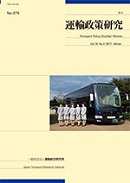Volume 19, Issue 4
Displaying 1-4 of 4 articles from this issue
- |<
- <
- 1
- >
- >|
Report
-
2017Volume 19Issue 4 Pages 002-012
Published: February 10, 2017
Released on J-STAGE: February 12, 2019
Download PDF (1433K) -
2017Volume 19Issue 4 Pages 013-024
Published: February 10, 2017
Released on J-STAGE: February 12, 2019
Download PDF (1533K) -
2017Volume 19Issue 4 Pages 025-031
Published: February 10, 2017
Released on J-STAGE: February 12, 2019
Download PDF (1425K)
Updates and information
-
2017Volume 19Issue 4 Pages 032-036
Published: February 10, 2017
Released on J-STAGE: February 12, 2019
Download PDF (1839K)
- |<
- <
- 1
- >
- >|
